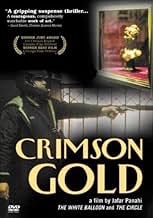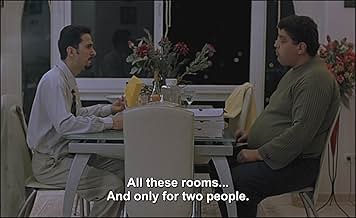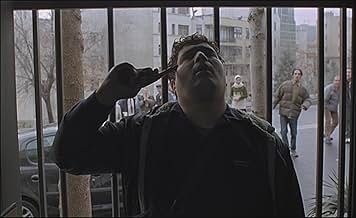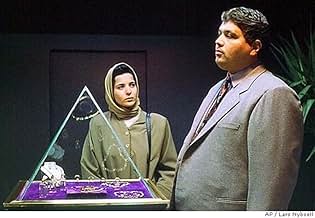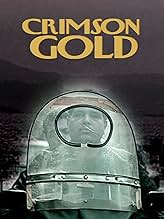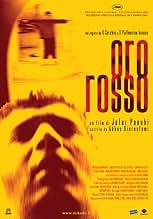ÉVALUATION IMDb
7,4/10
5,6 k
MA NOTE
Ajouter une intrigue dans votre langueAn Iranian pizza delivery man sees the worst of corruption and social unbalance in his city and is driven to crime.An Iranian pizza delivery man sees the worst of corruption and social unbalance in his city and is driven to crime.An Iranian pizza delivery man sees the worst of corruption and social unbalance in his city and is driven to crime.
- Prix
- 4 victoires et 2 nominations au total
Avis en vedette
Jafar Panahi is one of the best directors of Iran,his works are upon the best movies of the world,showing the social problems of Iran,after wards Sohrab Shahid Sales is the best choice for watching movies,Crimson gold is the story of Hossein a soldier in Iran-Iraq war who got toxicated by chemical bombs is a mugger,and he delivers pizzas when doing his job he confronts completely different situations which his within is dazzled by them,he saw his friend which he wad a soldier too ,in a luxurious house,Hossein delivered pizza to his house and the price was 20.5 $,he paid him 21 bucks instead an d told him ,keep the tip,he saw the pain if society,he saw the pain within,every time he went to the jewellery's galleries he confronted with shocking prices, this movie is unrealizable for foreigners because they don't know the picture of our society and it's levels, first our society had three levels but the second level is vanishing and there will be only the level that lives in poverty ,and the level that is vomiting money, this movie is not the best movie,it's good but it has some boring scenes,but the direction,camera angles are good, this movie has somethings hided behind the scenes,you should know Iran to see this movie by the way i give it 7.2 out of 10
Hussain was a metaphor for the people of Iran. The somnambulent, drugged out pizza deliveryman who was once thought of as heroic, now relegated to menial labor -- with only a small hint of what his life was like "before." The glimpses life in Teheran alone make this film intriguing and important viewing. This film was the source of much lively discussion at dinner afterwards. It was a revelation to most of us that not only were pizzas delivered in Teheran, but people could be arrested simply for attending parties in private apartments. It was also a revelation to most of us that luxurious jewelry stores operated in Iran, with Italian crafted jewelry, and the clientele to support them. Not to mention the luxurious, swimming pool equipped penthouse in the final scenes.
This is a bit of a dream team coming together for a recent iranian film: Kiarostami writes and Panahi directs. And the film is an appropriate hybrid. It has the sloow, thoughtful, gritty realistic, real-life dialogue laden, meandering-but-focused story that Kiarostami makes, along with the focus on social injustice that Panahi had in the Circle.
It's on the top ten for Iranian film which means definitely get it. Great film. Great photography. Lots of teheran and iranian morality police -- cool. If you can't stand movies that don't have a clear Hollywood plot -- if you don't like art house movies -- if you get bored or tired in slow movies -- don't rent it.
It's on the top ten for Iranian film which means definitely get it. Great film. Great photography. Lots of teheran and iranian morality police -- cool. If you can't stand movies that don't have a clear Hollywood plot -- if you don't like art house movies -- if you get bored or tired in slow movies -- don't rent it.
Winner of the Jury Award at the 2003 Cannes Film Festival but sadly banned in Iran, Jafar Panahi's Crimson Gold shows the growing chasm in Iran between rich and poor and the psychological effects of living under a regime based on fundamentalist religion. Written by famous Iranian director Abbas Kiarostami, it is based on a newspaper account of a similar incident that took place several years ago in Tehran. The film opens inside a jewelry store where a robbery is taking place. As a crowd gathers, the robber is trapped when the security system is released and the bars close over the front door. Flashbacks then show the events that led up to the crime and the film speculates as to what might have led to this act of desperation.
Hussein (Hossain Emadeddin), an alienated heavy set man who hides his emotions, is a pizza deliveryman in Tehran who takes cortisone shots to relieve the pain of injuries sustained in the Iran-Iraq War. He is engaged to be married to his friend Ali's (Kamyar Sheissi) sister but they communicate little. Ali is a thief who snatches women's purses but is an amateur bungler who rarely scores a big take. On examining the contents of a purse with Hussein at a restaurant, they discover the receipt for an expensive necklace and their fascination leads them to visit the jewelry store where it was purchased. When the owner refuses to let them in the store because of their dress, resentment boils.
Another incident reinforces this hurt. Hussein is forced by security police to wait outside a building as they arrest people attending a party for allegedly violating the social code of the regime that prohibits men and women from dancing together. Though he good-naturedly hands out pizzas to the police and the detainees waiting outside the building, he is upset at the manner in which he is treated. A bizarre final sequence raises Hussein's anger to the breaking point. He delivers a pizza to a lavish penthouse apartment where he is invited in by the wealthy tenant (Pourang Nakaheal), a young man who recently returned to Iran after staying with his parents in the U.S. The man, who appears to be lonely, talks incessantly, complaining about the "city of lunatics" he has returned to. As the young man chats on the cell phone, Hussein wanders through the house amazed at its affluence. He finds a rooftop swimming pool and jumps in fully clothed, then sits on the roof simply gazing at the city below. Fuming inwardly, the very next day he walks into the jewelry store with a loaded gun.
Crimson Gold bravely depicts the powerlessness of the individual in an authoritarian society, yet Hussein's emotional repressiveness and the telegraphing of the final outcome dilutes the film's tension, almost to the point of lethargy. To his credit, Panahi makes a strong statement but does not wallow in polemics, making it clear that the crime results from a combination of both social and psychological factors. Hussein is not an ordinary individual beaten down by the system but a walking time bomb, a man physically and mentally damaged by the war, uncommunicative, and humiliated by each slight, no matter how minor. Like Hussein, Panahi knows something about the feeling of being trapped and humiliated and his experience lends immediacy to the film. In 2001, the director was detained, then chained to a bench for ten hours because he refused to be fingerprinted and photographed by US authorities at JFK airport, a reminder that assaults upon human dignity are not limited to a single country.
Hussein (Hossain Emadeddin), an alienated heavy set man who hides his emotions, is a pizza deliveryman in Tehran who takes cortisone shots to relieve the pain of injuries sustained in the Iran-Iraq War. He is engaged to be married to his friend Ali's (Kamyar Sheissi) sister but they communicate little. Ali is a thief who snatches women's purses but is an amateur bungler who rarely scores a big take. On examining the contents of a purse with Hussein at a restaurant, they discover the receipt for an expensive necklace and their fascination leads them to visit the jewelry store where it was purchased. When the owner refuses to let them in the store because of their dress, resentment boils.
Another incident reinforces this hurt. Hussein is forced by security police to wait outside a building as they arrest people attending a party for allegedly violating the social code of the regime that prohibits men and women from dancing together. Though he good-naturedly hands out pizzas to the police and the detainees waiting outside the building, he is upset at the manner in which he is treated. A bizarre final sequence raises Hussein's anger to the breaking point. He delivers a pizza to a lavish penthouse apartment where he is invited in by the wealthy tenant (Pourang Nakaheal), a young man who recently returned to Iran after staying with his parents in the U.S. The man, who appears to be lonely, talks incessantly, complaining about the "city of lunatics" he has returned to. As the young man chats on the cell phone, Hussein wanders through the house amazed at its affluence. He finds a rooftop swimming pool and jumps in fully clothed, then sits on the roof simply gazing at the city below. Fuming inwardly, the very next day he walks into the jewelry store with a loaded gun.
Crimson Gold bravely depicts the powerlessness of the individual in an authoritarian society, yet Hussein's emotional repressiveness and the telegraphing of the final outcome dilutes the film's tension, almost to the point of lethargy. To his credit, Panahi makes a strong statement but does not wallow in polemics, making it clear that the crime results from a combination of both social and psychological factors. Hussein is not an ordinary individual beaten down by the system but a walking time bomb, a man physically and mentally damaged by the war, uncommunicative, and humiliated by each slight, no matter how minor. Like Hussein, Panahi knows something about the feeling of being trapped and humiliated and his experience lends immediacy to the film. In 2001, the director was detained, then chained to a bench for ten hours because he refused to be fingerprinted and photographed by US authorities at JFK airport, a reminder that assaults upon human dignity are not limited to a single country.
Written by the most prominent figure in Iranian social realist cinema, Talaye Sorkh is very much suggestive of some social realities in contemporary Iran. Following an underclass pizza-delivery man for a day or two of his life, Panahi's camera pictures a story that speaks only not for Hussein, but also for many of his real-life fellow citizens in Tehran. Although the film appears to be highly critical of the current social gap between the rich and the poor, Talaye Sorkh is more about alienation and marginalization. Hussein is a war veteran who is devastated by the contradictions of the values he fought for in the Iran-Iraq war and what he witnesses in the affluent neighborhoods of northern Tehran, where he delivers pizzas. He is shocked to see a former lieutenant in one of those chic houses. Thanks to Hussein Emaduddin's great performance, the film by no means begs for sympathy. It seems that the tensions of the society in which Hussein lives, has made him an emotionless man. Hussein's toneless attitude and his unusual calmness speaks of a man whose tolerance comes to a rapid explosion at the end. He is a sort of man who is unable to even feel for his fiancé. Robbing young women's purse doesn't seem to interest him either. Throughout the entire film he is in a state of shock. Although the film's plot is based on a true story, its dialog seem a bit incompetent and weak at times. The dolly shots and the overall camera-work however perfectly contributes in suggesting a schizophrenic atmosphere which has indeed been the intention of Panahi as well. Panahi's latest film is very much similar in theme with his previous award winning Dayareh. That film is also recommended for those who enjoyed this one.
Le saviez-vous
- AnecdotesThe lead actor, who plays a pizza delivery man, is actually a pizza delivery man in real life. He is also a paranoid schizophrenic, which may explain some of the character's traits and behavior.
- ConnexionsFeatured in Cinema Iran (2005)
Meilleurs choix
Connectez-vous pour évaluer et surveiller les recommandations personnalisées
- How long is Crimson Gold?Propulsé par Alexa
Détails
- Date de sortie
- Pays d’origine
- Sites officiels
- Langue
- Aussi connu sous le nom de
- Crimson Gold
- Lieux de tournage
- Téhéran, Iran(location)
- société de production
- Consultez plus de crédits d'entreprise sur IMDbPro
Box-office
- Brut – États-Unis et Canada
- 148 959 $ US
- Fin de semaine d'ouverture – États-Unis et Canada
- 13 476 $ US
- 18 janv. 2004
- Brut – à l'échelle mondiale
- 400 768 $ US
Contribuer à cette page
Suggérer une modification ou ajouter du contenu manquant



